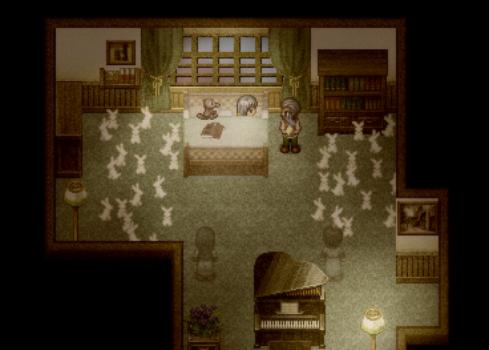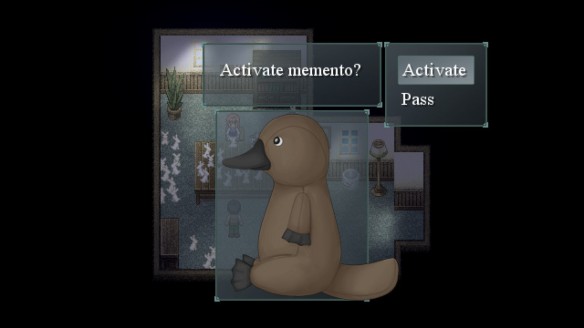 If you have not yet played To The Moon – why haven’t you? It’s easily available on either Steam or GOG.com, it only takes about 4 hours to complete, runs pretty much on any computer, it’s inexpensive and worth every penny. Trust me (and every critic who has reviewed the game) – go play it; it’s worth your time. But in case you still don’t want to do so, be warned – MASSIVE SPOILERS AHEAD.
If you have not yet played To The Moon – why haven’t you? It’s easily available on either Steam or GOG.com, it only takes about 4 hours to complete, runs pretty much on any computer, it’s inexpensive and worth every penny. Trust me (and every critic who has reviewed the game) – go play it; it’s worth your time. But in case you still don’t want to do so, be warned – MASSIVE SPOILERS AHEAD.
My original intention was to do a single article on To The Moon, but despite its short length, the themes touched upon by the game were so deep and rich, I felt that it deserved a more detailed treatment. Lord willing, we will discuss the following in Parts 2 to 4:
Part 2 – Love & Romance
Part 3 – Death & Mortality
Part 4 – Happiness & A Life Well Lived
***
I just got posted to a new high school this year and I’m still learning my new colleagues’ names. This morning I walked into class with a colleague as my co-teacher, and I said to the class: “Could you please greet Ms Melissa Goh and then greet me?”. Ms Goh very gently turned to me and said, “erm…actually, my name is Michelle”.
It is embarrassing to forget things, particularly important things such as names. Ever since I entered my 20s, my short term memory started to degenerate, and nowadays I can hardly remember any task which I do not ask my phone to remind me (Thank God for technology!). I sometimes wondered if one day I would get married and consistently forget about my (hypothetical) wife’s birthday, our anniversary, or how we first met. That would be more than just embarrassing – that would be heartbreaking.
[FINAL WARNING – MASSIVE SPOILERS ALERT]
In To The Moon, Johnny Wyles forgot a very precious memory. It wasn’t his fault – his memory loss was induced upon him by drugs administered to him. But the fact remains that Johnny Wyles forgot how he first met River, the woman he would later marry. This tragedy was further compounded by River’s condition (some form of autism or Asperger’s), as she never realized that he had forgotten until they had been married for several years (maybe decades). This must present the uncomfortable question to River – who was this man that she married, if the various things she held dear (such as the platypus and the lighthouse) never held the same significance to Johnny? If she did not marry the man she thought she had married – does this not make the marriage void? Later on (chronologically), River was dying, but she refused treatment in order that the house next to the lighthouse could be built – if her husband would not remember, she would rather not live (more about this in Part 4).
Much in the same way, is our relationship with God. Our relationship with God is built upon what God had done for us. Most of us had experienced how God had delivered us from points of downfall in our lives – perhaps some of these experiences are precisely why we are Christian today. Aside from our experiences, there is also knowledge of what God had done in order to secure our salvation and our blessings – the work of Christ on the cross. Yet all too easily, we fail to remember. We fail to remember when we get preoccupied with the daily grind. We fail to remember when we get preoccupied with our current obstacles and conflicts. We fail to remember when other people sin against us and we feel the need to vent. We fail to remember how much God had done for us. We fail to remember our infinite indebtedness to God. We fail to remember to be grateful. We fail to remember that our purpose is to live for God. We fail to remember the cross. We fail to remember Christ.
“People need to be reminded more often than they need to be instructed” – Samuel Johnson
It is not too far a stretch to say that forgetfulness is the primary reason why we as Christians continue to struggle with sin. We have already tasted the goodness of Christ. We have already obtained salvation by faith. We already have the hope of future glory. Yet our flesh continues to tempt us with worldly desires and self-preoccupation. So tempted are we, that we forget what we have tasted, what we have obtained, what we have to hope for. How amazing then is the grace of God, that time and time again He would draw us back to Him when we forget Him, instead of just letting us get what we deserve for deserting Him.
Memories and mementos are the central motif of To The Moon; this is emphasized even in the game mechanics – a memento needs to be “activated” each time before the game can advance to the next “level”. In the same way, our remembrance of God, particularly what had been done for us at the cross, should be the central motif of our lives. But to push aside the self-centered clutter of our daily lives, we will need to daily “activate” our memory of what God had done. We need to preach the gospel to ourselves each and everyday of our lives, so that Christ be kept the the center of our lives.
Lest I forget Gethsemane,
Lest I forget Thine agony;
Lest I forget Thy love for me,
Lead me to Calvary.



Do you feel like your memory degeneration is medical or just a direct result of abundant use of technology? I’m curious.
In any case, thank you so much for writing about this game. I’m excited because your attention to detail is humbling. I didn’t even make the connection to Johnny’s childhood memories being locked-out because of drugs. I thought he just simply didn’t know because he was generally forgetful (as I tend to be about details that others find important). In this instance, your exegesis is very helpful.
I agree that we’re often forgetful of what God has done and that mementos need to be remembered and focused on. It’s always good to sit and think about all that God has done.
I actually think it is because I didn’t practice my memory much when I was young – and I think there are some neuroscience studies which support this hypothesis. If that is true, like you implied, because of how technology negates the need for children to practice their memory as much, their memories would get progressive worse when they grow up.
I come from the tradition where we think it is essential to “preach the gospel to yourself” daily. I believe this sentiment most famously came from Jerry Bridges. The theology behind this is that the continual rememberence of what God had done for us on the cross is the engine which powers our Christian lives and the desire to please God and live for His glory.
Excellent points, Yann! It’s funny. While you were just commenting, you came up in a conversation my friend and I were having. He just asked me if I had been to Singapore. Then he told me he had been there twice within the last year and that I would really like it. I was thinking, the main reason I like that idea is because I’d probably get to hang out with you. The second motivation? I’m deeply furious about life there. It sounds awesome.
I’m not sure why, but lots of Americans love Singapore when they come visit. Do let me know if indeed you make plans to visit; I’ll be more than happy to chill together and show you around!
Yeah. My buddy’s Pastor friend liked Singapore enough to marry a girl from there. And Singapore apparently has a pretty good music scene, so that’s how my buddy got there (does sound for bands).
Pingback: Where We've Been - Lazy Edition - Theology Gaming